With the holidays approaching, Pace’s Center for Community Action and Research is here to help students, staff, and faculty find ways to connect with and give back to their community.
From Military Bases to the Big Apple
Ryn Morris ’25 grew up on military bases across the globe, fostering a deep passion for community. Now, she’s found a new home at Pace University, where she’s embraced leadership and connection.
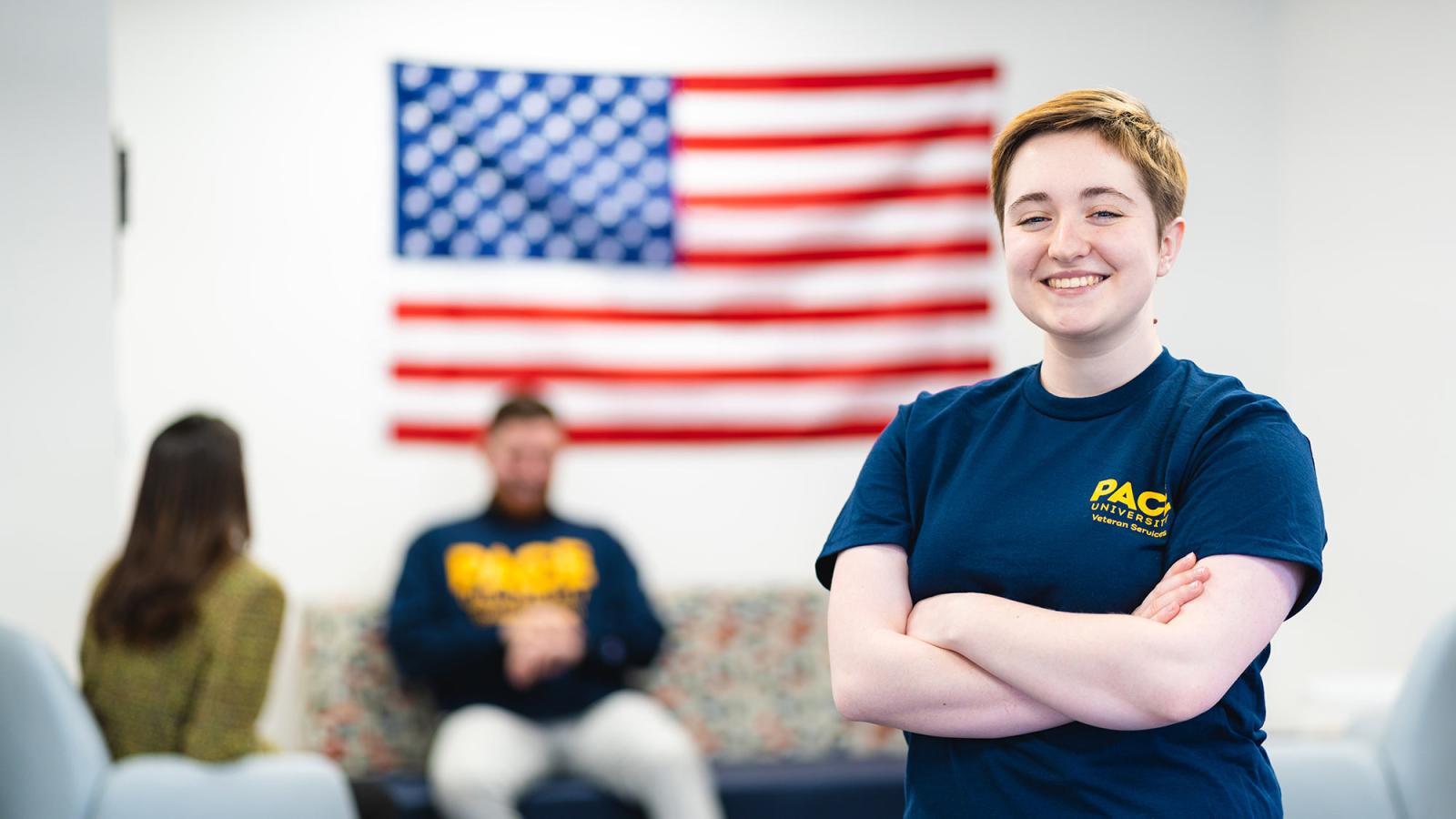

Kathryn "Ryn" Morris ’25 had what she calls a "pretty standard" life as a military dependent—though for most, it was anything but standard. Her family moved frequently every few years, living in diverse places such as the Yongsan Garrison in Seoul and Barking Sands in Hawaii. "Moving around like that does something to you as a kid," she reflects. "It gave me a deep love for travel and an appreciation for learning about different cultures."
Not only that, but it instilled in Ryn a deep appreciate for the concept of community. "As a result of those experiences, I care deeply for the community, and it’s a huge part of my identity," she explains. "Military people tend to click with each other, regardless of their background," she explains. "The surrounding families on base aren’t just neighbors; they become aunts and uncles, and their kids are like cousins."
I’ve been able to take advantage of a multitude of opportunities as a result of Pace University’s Yellow Ribbon Program.
Kathryn’s connection to the military runs deep. "Many of the men in my immediate family were military members," she shares. Her family’s military legacy includes her uncle, who served in the Coast Guard, a cousin and grandfather in the Army, and her father, a retired Navy Commander who served for 24 years.
Kathryn's decision to attend Pace was influenced by several factors, including the well-recognized Arts and Entertainment Management program, robust GI Bill acceptance, and generous scholarship offers. "I’ve been able to take advantage of a multitude of opportunities as a result of Pace University’s Yellow Ribbon Program,” she explains. “The financial support is unmatched for someone in my situation.” No stranger to moving to new places, the allure of New York City certainly played a part in her decision to come to Pace.
I’ve been able to take advantage of leadership and networking opportunities that have helped me in my college journey.
She’s been glad to find that sense of community right here at Pace, particularly among the Student Veterans of America (SVA). "The SVA has been incredibly welcoming and supportive of me at every turn,” says Ryn. “I’ve been able to take advantage of leadership and networking opportunities that have helped me in my college journey." They’ve been with her through all the challenges and changes of her academic career, even when her wanderlust took her away from New York City. "Last year, they were an integral part of my support network when I was abroad and helped me adjust to Pace life again when I was home again."
Now, in her final year, Ryn’s advice to other students is to do as she did—dive in, get involved, and find your people. "Get engaged! There are so many fun clubs and activities on campus, truly something for everyone,” she says. “It improves our school culture the more we participate!"
More from Pace
The transition into higher education is always bumpy but can be especially challenging for veterans and those leaving active service. A sense of community not only bridges the civilian-veteran gap, but can also improve veteran’s mental health and sense of purpose after service. Two veterans from the Pace Community weigh in on the importance of inclusivity, community, and what it means to be a student veteran.
New Club Alert: Pace’s Seidenberg School Launches Google Developer Student Club
Pace University’s Seidenberg School of Computer Science and Information Systems recently launched a Google Developer Student Club (GDG) on the New York City campus.
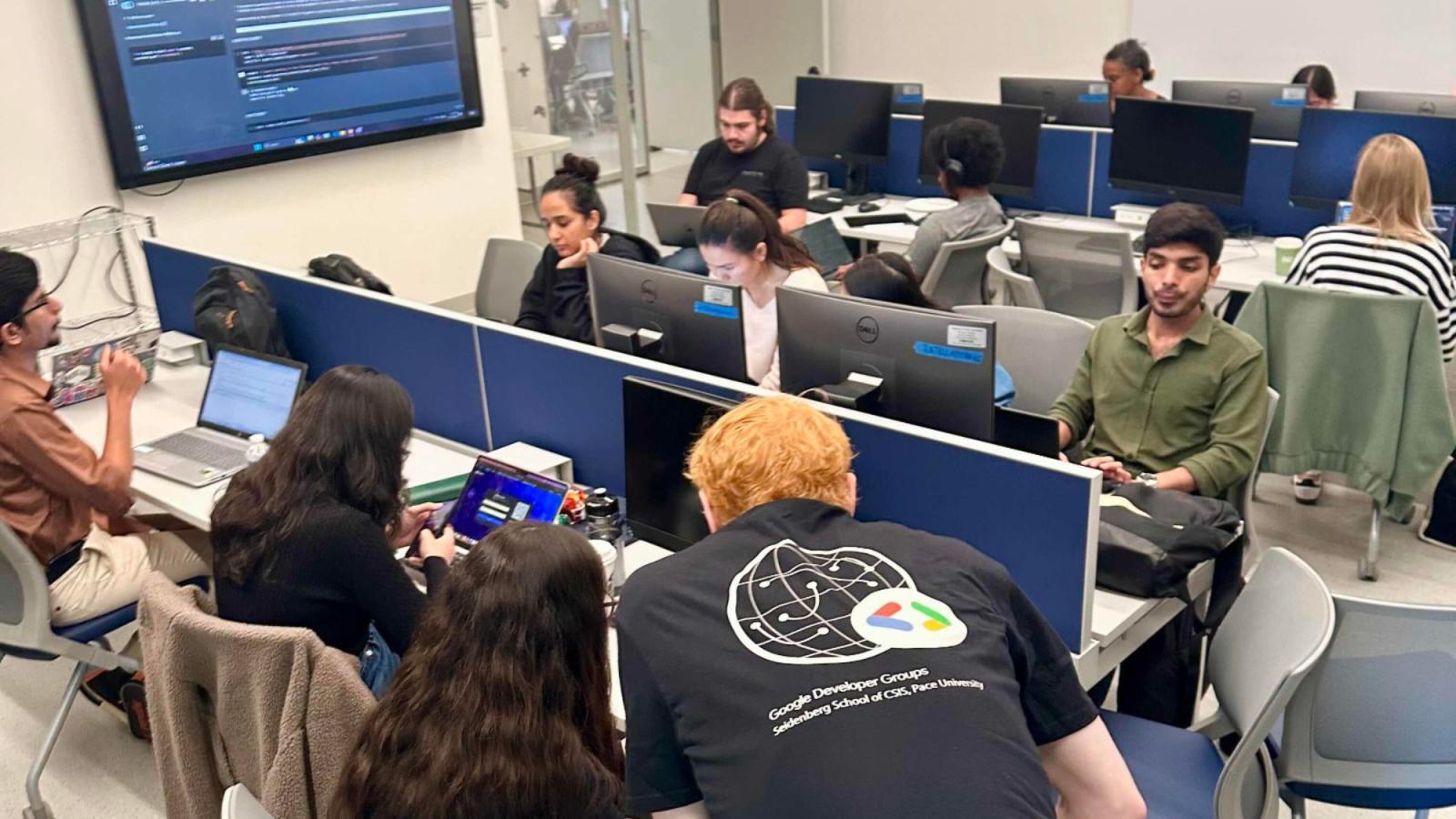
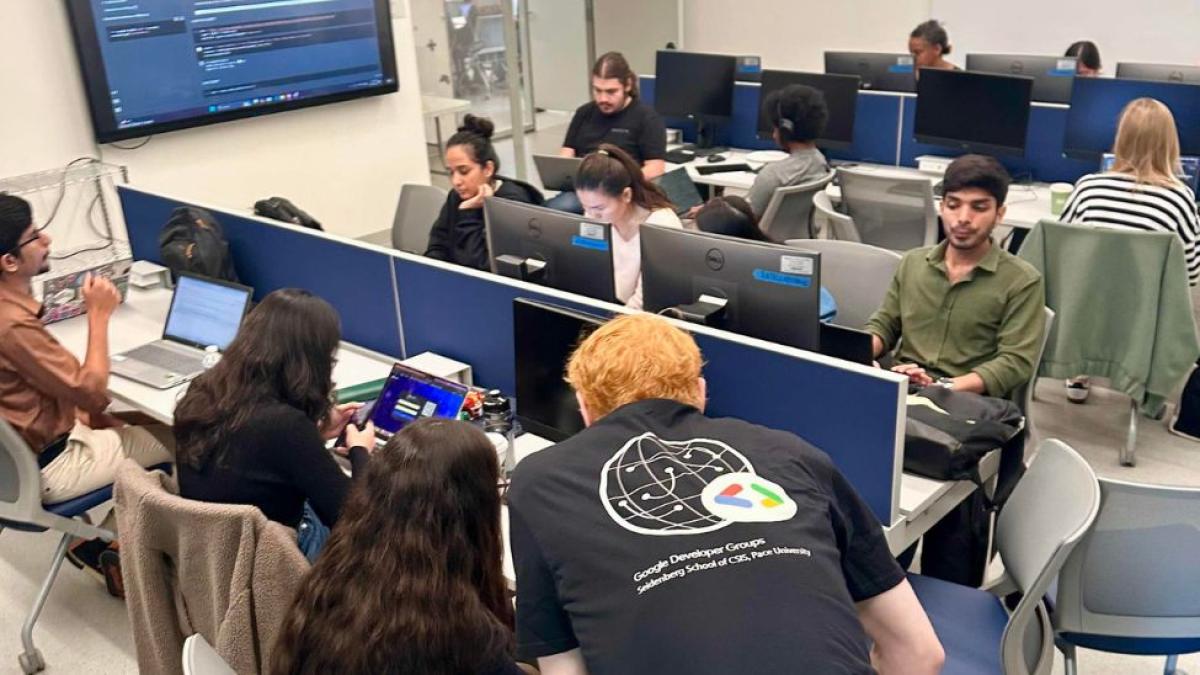
Pace University’s Seidenberg School of Computer Science and Information Systems recently launched a Google Developer Student Club (GDG) on the New York City campus, an initiative that connects student developers and gives teaches them the tools to build solutions for local businesses and communities with Google technology. Designed for those interested in the tech industry, the club offers students a unique opportunity to explore and gain hands-on experience with Google’s suite of cutting-edge technologies, especially in the fast-evolving fields of artificial intelligence and machine learning.
The Google Developer Student Club at Pace is led by Seidenberg graduate student Lauren DeMaio and mentored by Seidenberg Professor, Associate Dean, and Co-Director of the Pace AI Lab, Dr. Christelle Scharff, who also has experience empowering women in tech by being an active member in Google’s Women in Techmaker community. As Lauren explained, the club’s mission is to equip students with the tools and skills necessary for professional success while focusing on creating a supportive, community-driven environment. “Being a newly founded GDG on Campus, it is important to me that we are keeping the community’s wants and aspirations at the forefront of our planning,” Lauren said. “Together, GDG and GDG on Campus communities aim to connect aspiring developers with the tools necessary for post-university success and networking opportunities for professional development.”
The club’s first event, an ML Study Jam, provided students with a foundational look into machine learning (ML), offering hands-on activities and expert-led insights. ML Study Jams are part of a global initiative designed to help learners develop their skills and confidence as they move toward expertise in machine learning. “The idea is to go through basic ML concepts and share the knowledge in the community,” said Lauren. “By honing skills and enhancing capabilities, a beginner can start their journey to becoming an ML expert.”
The ML Study Jam began with a keynote speech from Tanmay Bakshi, a Google Developer Expert in Machine Learning who also serves as an AI & Software Architect at IBM. Tanmay is well-regarded for his work as a TED speaker, author, and YouTuber, with a focus on AI and ML concepts. His keynote introduced attendees to foundational machine learning concepts, including tensors and the PyTorch framework. Lauren described Tanmay’s talk as “inspiring for the attendees,” highlighting his valuable insights on AI and his journey in the tech world.
For the event’s hands-on component, Carson Glines, the club’s technical lead, guided students through a Google Colab workshop using Gemini Flash. In this workshop, students interacted directly with ML models, practicing prompt creation, summarizing audio files, and asking models to describe images in different styles. This interactive session gave students practical exposure to working with AI tools, building both confidence and technical proficiency.
With a vision centered on community engagement and technological proficiency, the GDG on Campus at Pace University plans to host events that continue to explore AI and machine learning tools. “As a GDG on Campus, we aim to introduce students at Pace to a variety of Google’s AI/ML products and tools, making them comfortable to develop projects and furthering their knowledge and practical skills,” Lauren shared.
Through mentorship from Dr. Scharff and the drive of its members, the GDG on Campus at Pace is set to become a foundational resource for students eager to deepen their understanding of AI and ML while building a network of connections in the tech industry. This new addition to the Seidenberg School offers students a structured and collaborative space to grow, learn, and prepare for successful careers in technology.
If you are a student interested to join, feel free to do so via the link provided at the beginning of the article, or by contacting the club’s leads:
Lauren DeMaio
Graduate Student: Lead Organizer
Email: ld90692n@pace.edu
Jenn Garcia
Graduate Student: Events Lead
Email: jg34071n@pace.edu
Audrey Louie
Undergraduate Student: Marketing Lead
Email: al83037n@pace.edu
Julia Tretyakov
Undergraduate Student: Financial Lead
Email: jt23750n@pace.edu
Stephanie Sicilian
Graduate Student: Communications Lead
Email: ss43992p@pace.edu
Carson Glines
Undergraduate Student: Technical Lead
Email: cg08193n@pace.edu
Tips for Tackling Exam Season
We could tell you to start by organizing your study materials and creating a study schedule to break your subjects into manageable portions, but you already know that. Here are some not-so-obvious tips to help YOU make it through exam season.

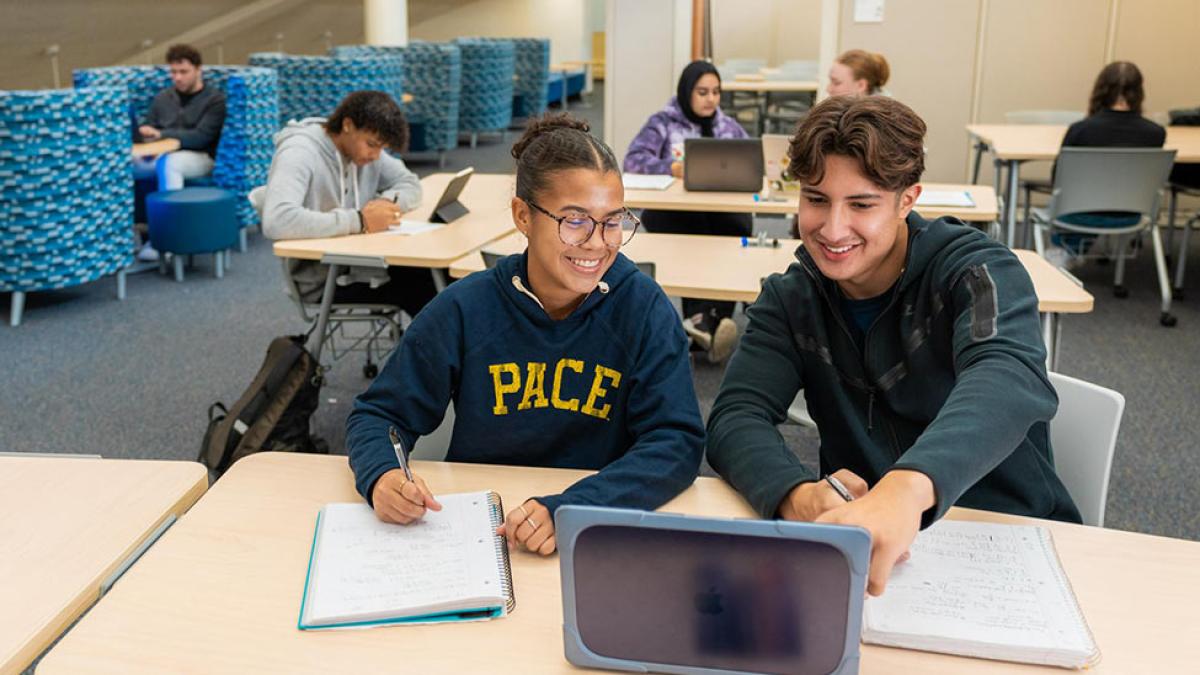
Here are some friendly tips to help you tackle your exams with confidence. We could tell you to start by organizing your study materials and creating a study schedule to break your subjects into manageable portions, but you already know that. Here are some not-so-obvious tips to help YOU make it through exam season:
- Say no to all-nighters. Remember, sleep is your brain's best friend! Aim for seven to nine hours of rest each night. Your memory and focus will thank you.
- Keep your energy up with balanced meals. A well-nourished body is the foundation for a focused mind. Also, you should probably be drinking more water…
- Active learning rocks. Engage with the material actively. Try explaining it out loud or drawing diagrams. This will help you understand and remember better.
- Study groups for the win. Join a study group or find a study buddy. Sharing the journey with someone can provide emotional support and a fresh perspective can make a difficult concept much clearer.
- Seek guidance. Don't be afraid to reach out to your professors or academic advisors if you're struggling with any topic. They're there to help and guide you. If you need some very specific extra help, get connected with Pace’s Learning Commons or utilize research resources and support offered by the Pace Library.
- Celebrate small wins. Recognize and reward yourself for each milestone. Whether it's mastering a difficult concept or completing a chapter, treat yourself to a little self-care or a fun snack.
- Reset your brain. Take short breaks to practice mindfulness or meditation. It's like a reset button for your brain, and it can help reduce stress.
- Take advantage of the resources available to you as a Pace student. There are a ton of offices, resources, and people at Pace here to help you maintain your wellbeing, even during stressful times. Check out all of our Wellness resources and don’t be shy about reaching out.
You're not alone in this—countless students have faced finals and emerged victorious. With your determination and these tips, there's no challenge too big. Go rock those exams!
NYC Subway Chokehold Death Trial Begins: Daniel Penny Faces Manslaughter Charges
Huab Law Professor Gershman speaks to USA Today about the challenges facing the defense team in the unfolding Daniel Penny trial, noting the unpredictability of NYC’s subway as a key factor in the case.
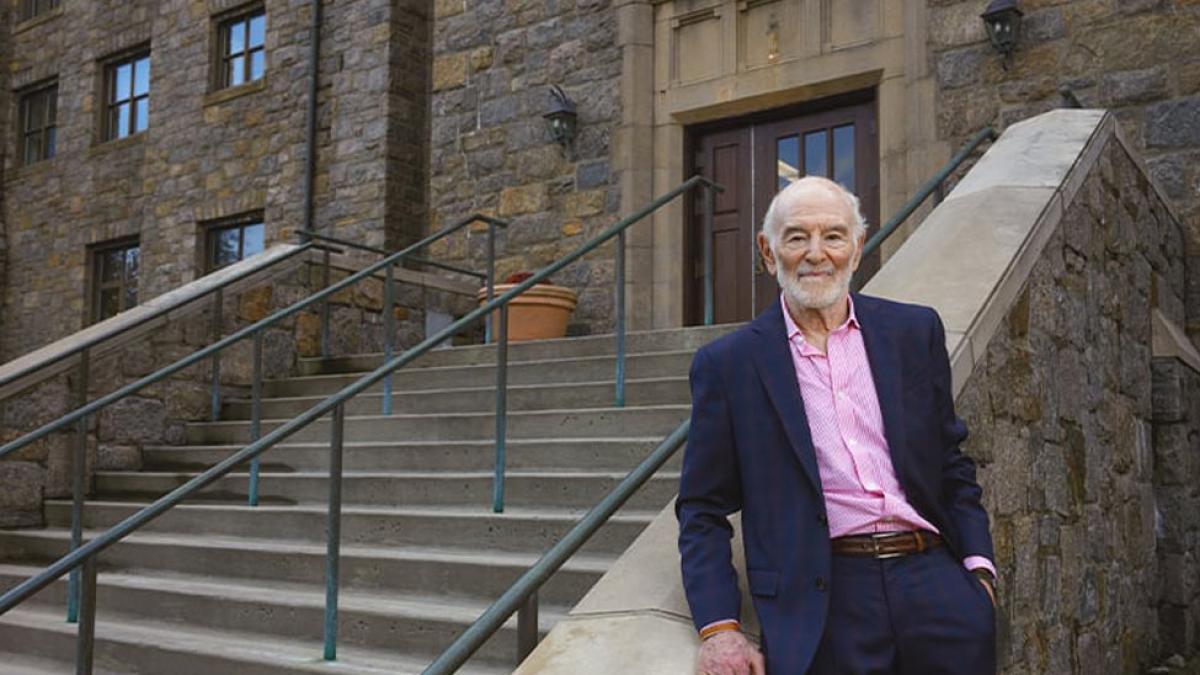
Lights, Camera, Action: Why the Film Industry LOVES Our Northern Westchester Towns
Filming also can provide a different revenue stream for local businesses. One such example is Pleasantville’s Pace University which has a very modern facility and a lot of acreage. “Pace University is a sought-after filming spot due to its versatile 200-acre campus, modern facilities, and proximity to New York City. The campus offers ample green space and diverse facilities that can accommodate wardrobe, makeup, and craft services,” explains Marshall. Additionally, Pace provides an on-site liaison to assist productions from start to finish. With plenty of room for parking and ancillary production space, the university has also been used as a base camp for HBO productions, including The Time Traveler’s Wife, The Gilded Age, and a not-yet-released film limited series starring Robert DeNiro, called Zero Day and a Netflix film starring Brie Larson that is not titled as of press time.
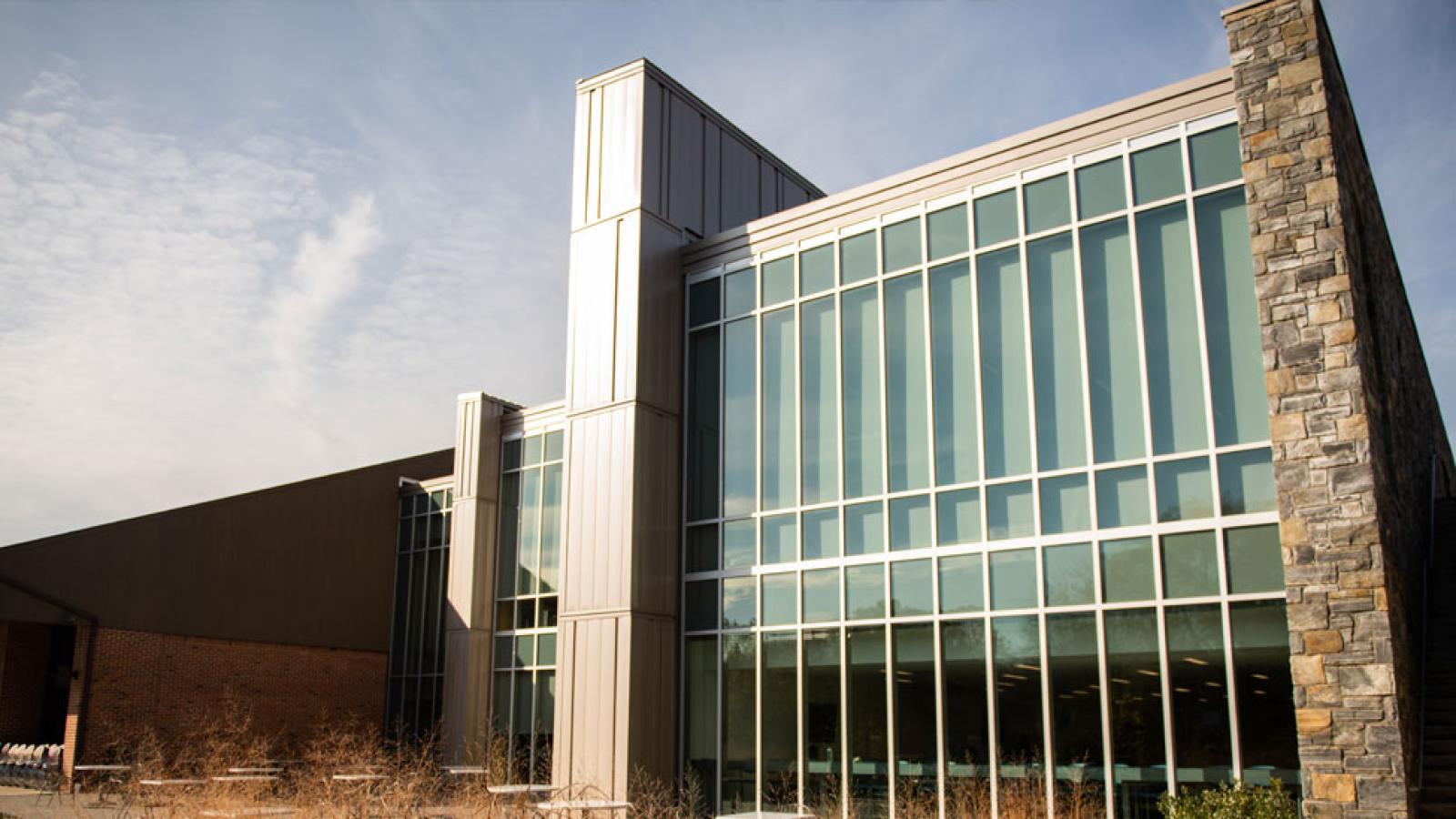
Election Day 2024: Watching Congressional Races
Dyson Political Science Professor Laura Tamman was featured on LiveNOW from Fox, offering expert analysis on key congressional races.
Trump's Presidential Election Win And What It Says About The Future Of Cancel Culture
Dyson Professor Melvin Williams discussed Trump’s election win and its impact on cancel culture with USA Today.
Online fodder alone may not invoke "permanent cancelations of celebrity figures, much less a political candidate as charismatic and unabashed as Trump," says Melvin Williams, associate professor of communication and media studies at Pace University.
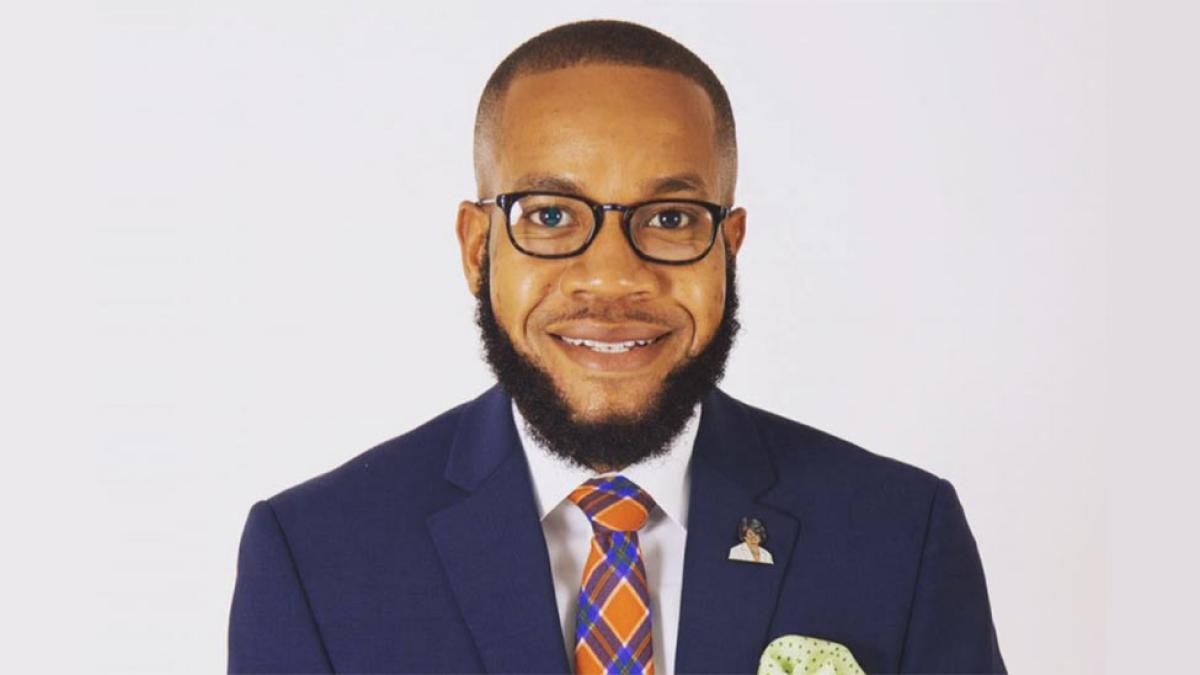
Great Lakes Institute of Management Enters Into Strategic Partnership With Pace University, New York, USA
Great Lakes Institute of Management formalized a strategic partnership with a renowned and long standing U.S. educational institution of repute—Pace University, New York. This collaboration marks a significant milestone in Great Lakes' ongoing efforts to enhance internationalization and foster cross-cultural academic collaborations. The executive leadership team from Pace University, led by President Dr. Marvin Krislov, visited the Great Lakes Gurgaon campus to mark this significant occasion. Dr. Krislov stated, “Pace University is honored to forge this partnership with Great Lakes Institute of Management, recognizing India’s growing influence as a global economic powerhouse and a hub of innovation. Through this alliance, we aim to bridge American and Indian academic strengths, creating opportunities for our students to engage with one of the world’s most dynamic markets. We look forward to fostering a rich exchange of ideas, cultures, and expertise, empowering our students to become globally-minded leaders ready to make a meaningful impact worldwide.”
Why Is Disney Pouring Money Into Its Cruise Line? To Offer A Luxury 'Disney Experience'
“It’s part of the total pent-up demand for tourism coming out of Covid,” says Andrew Coggins Jnr, a cruise industry analyst who teaches at Pace University’s Lubin School of Business. “The industry is very bullish about what’s coming up ahead.”

"He Now Has immunity": Expert Warns Second Term Trump Can Do "Awful Lot" Without Fear Of Prosecution
Elisabeth Haub School of Law Professor Bennett Gershman analyzed the implications of a Trump second term with Salon.


